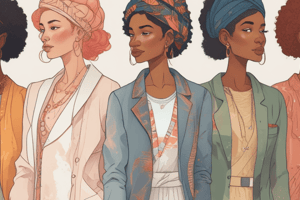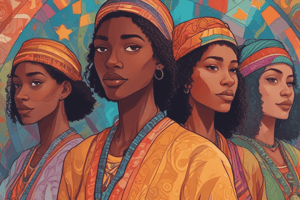Podcast
Questions and Answers
What is the key component of human connection?
What is the key component of human connection?
- Respecting others' rights
- Human rights
- Empathy (correct)
- Inclusion
What is the main focus of inclusion?
What is the main focus of inclusion?
- Upholding human rights
- Creating a sense of belonging (correct)
- Promoting diversity
- Understanding and valuing differences
Which rights are considered universal and apply to everyone, everywhere?
Which rights are considered universal and apply to everyone, everywhere?
- Human rights (correct)
- Civil and political rights
- Fundamental rights
- Social, cultural, and economic rights
What is the ability to understand and share the feelings of another called?
What is the ability to understand and share the feelings of another called?
What does respecting others' rights involve?
What does respecting others' rights involve?
Study Notes
I Respect Other's Rights: A Guide to Equality, Diversity, Inclusion, Empathy, and Human Rights
In today's world, respecting others' rights is more important than ever. This article will explore the concepts of equality, diversity, inclusion, empathy, and human rights, and how they are interconnected. By understanding these concepts and practicing them, we can create a more harmonious and inclusive society.
Equality
Equality refers to the state of being equal, especially in terms of rights and opportunities. It is a fundamental human right that is recognized by international law, and it is essential for maintaining peace and stability in society. Equality acknowledges that all people are entitled to the same rights and opportunities, regardless of their race, gender, religion, or any other personal characteristic.
Diversity
Diversity is the presence of variety in the human population, including differences in gender, race, ethnicity, age, socioeconomic status, education, and sexual orientation. It encompasses both visible (e.g., race, gender, age) and invisible (e.g., personality, cognitive style, abilities) characteristics of individuals. Embracing diversity means recognizing, respecting, and valuing the differences among us, as well as understanding that these differences have value and meaning.
Inclusion
Inclusion is the act of creating environments in which any individual or group feels welcomed, valued, and supported, regardless of their differences. It involves creating a sense of belonging for all people, fostering a sense of connection and community, and providing opportunities for all individuals to participate fully in the life of their community. Inclusion is not just about accommodating individual differences, but also about creating a sense of belonging and fostering a positive sense of identity.
Empathy
Empathy is the ability to understand and share the feelings of another. It involves putting oneself in someone else's shoes and trying to see things from their perspective. Empathy is a key component of human connection and helps us build trust and understanding with others. By practicing empathy, we can create a more compassionate and understanding society, where people are more likely to respect each other's rights.
Human Rights
Human rights are fundamental rights to which all individuals are entitled, regardless of nationality, sex, ethnicity, religion, language, or any other status. They include civil and political rights, such as freedom of expression, freedom of association, and protection against discrimination, as well as social, cultural, and economic rights, such as the right to food, housing, and education. Human rights are protected by international law and are considered universal, meaning they apply to everyone, everywhere.
I Respect Other's Rights: Putting It All Together
Respecting others' rights means acknowledging and valuing the unique qualities and characteristics of each individual, while also recognizing our shared human rights and responsibilities. By practicing empathy, embracing diversity, promoting inclusion, and upholding human rights, we can create a more harmonious and inclusive society where everyone feels valued and respected.
In conclusion, respecting others' rights is not just about treating everyone equally, but also about understanding and valuing the differences among us, fostering a sense of belonging, and promoting a culture of empathy and compassion. By practicing these principles, we can create a more peaceful, inclusive, and just world for all.
Studying That Suits You
Use AI to generate personalized quizzes and flashcards to suit your learning preferences.
Description
Test your knowledge of equality, diversity, inclusion, empathy, and human rights with this quiz. Explore interconnected concepts and learn how to create a more harmonious and inclusive society by understanding and practicing these principles.




